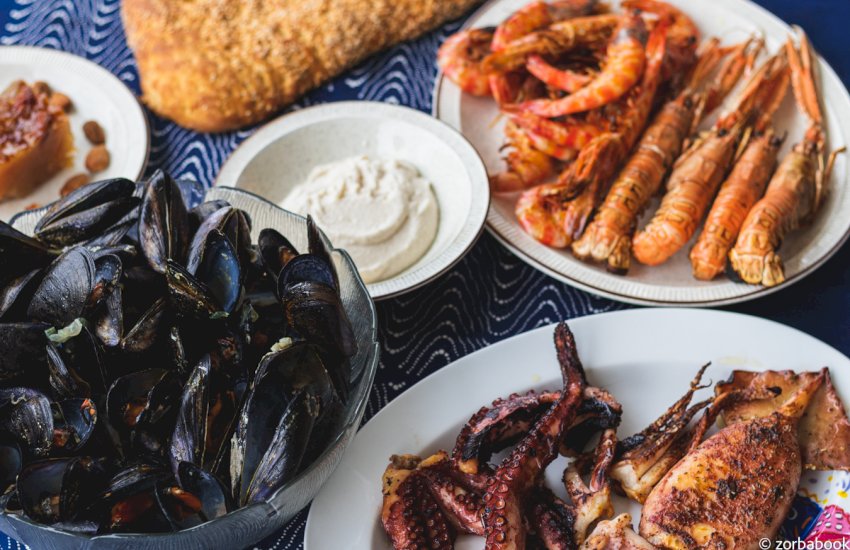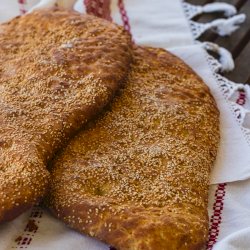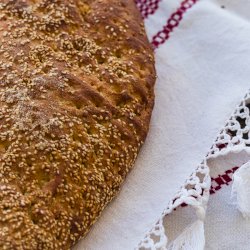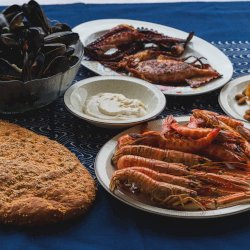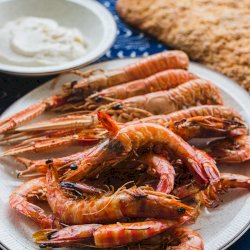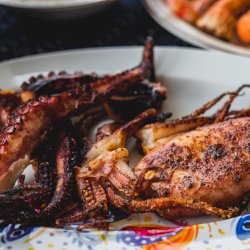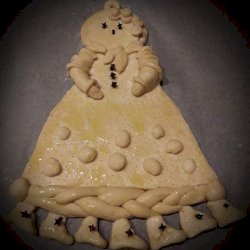Great Lent, Clean Monday, Lagana, Mrs Sarakosti
Greek Orthodox Lent (Great Lent)
In the Greek Orthodox Church, Great Lent (Megali Sarakosti) is a 40-day period of fasting, prayer, self-examination, and spiritual preparation leading up to Easter (Pascha). It begins on Clean Monday and ends on Holy Saturday, just before the celebration of Christ’s Resurrection. During this time, Orthodox Christians follow a strict fasting regimen, avoiding meat, dairy, and in many cases, fish and oil, focusing instead on simplicity, reflection, and acts of kindness. Lent is a time for spiritual renewal, church attendance, and self-discipline, as believers seek to strengthen their faith and prepare for Easter.
Kathari Deftera (Clean Monday)
Clean Monday (Kathari Deftera Καθαρά Δευτέρα or Green Monday in Cyprus) marks the beginning of Great Lent and is a day of cleansing and renewal. The name symbolizes the spiritual "cleansing" of the soul, as people enter a period of fasting and prayer. It is a public holiday in Greece, celebrated with outdoor gatherings, picnics, and traditional Lenten foods like lagana bread, taramas (fish roe dip), olives, pickled vegetables, and halva and the custom of flying kites, symbolizing the effort to reach the Divine. Clean Monday is also associated with katharsis (purification), encouraging believers to forgive, reflect, and start anew.
It is a moveable feast, occurring on the 6th Monday before Palm Sunday.
The term "Clean Monday" refers to the leaving behind of sinful attitudes and non-fasting foods. It is called "Ash Monday", by analogy with Ash Wednesday (the day when the Western Churches begin Lent).
Clean Monday as part of the Easter cycle and the Great lent, begins on the preceding Sunday night, at a special service known as the Ceremony of Mutual Forgiveness.
The name Clean Monday came from the housewives' habit in the past when on this Monday morning, they washed all the utensils with hot water and ashes. Then they hung them in a specific place, where they remained until the end of the fast. After cleaning, the whole family would go to the countryside and enjoy fasting food such as olives, tarama, halva and lagana and the kite flying.

Lagana: The Traditional Greek Bread of Clean Monday
Lagana is a special type of unleavened flatbread that holds deep cultural and religious significance in Greece. It is traditionally baked and enjoyed on Clean Monday (Kathara Deftera), the first day of Great Lent, marking the transition to a period of fasting and spiritual reflection in the Greek Orthodox tradition.
The name comes from the ancient Greek “laganon”, which was a flat dough made with flour and water and is mentioned in ancient texts as a delicacy. Aristophanes in Ecclesiastes play, mentions the phrase “λαγάνα πέττετται” meaning laganas are made. Lagana – Λάγανα was also a flatbread prepared as an offering to Gods by ancient Greeks.
Bakeries on Clean Monday are open exclusively for the preparation and sale of lagana.
On Clean Monday, lagana is eaten alongside other Lenten delicacies, such as taramas (fish roe dip), olives, pickled vegetables, and halva, symbolizing purity and simplicity as people begin their journey toward Easter.
More Than Just a Bread
Lagana is more than just a culinary tradition—it is a symbol of renewal and faith. As families gather to share this special bread, they also celebrate nature and the arrival of spring, often enjoying Clean Monday with outdoor picnics and kite flying.
This simple yet flavorful bread continues to be a cherished part of Greek culture, reminding people of the values of humility, simplicity, and togetherness.

Kyra Sarakosti: The Symbolic Lady of Greek Orthodox Lent
Kyra Sarakosti (Lady Lent) is a traditional Greek custom and visual representation of Great Lent (Megali Sarakosti). Unlike modern calendars, which count the weeks until Easter (Pascha) numerically, Kyra Sarakosti serves as a folk "calendar" that helps people track the Lenten period. She is depicted as a woman with seven legs, symbolizing the seven weeks of fasting before Easter.
________________________________________
The Symbolism of Kyra Sarakosti
Kyra Sarakosti is not just a simple drawing or craft—she embodies the spirit of Lent. Traditionally, she is a tall lady with a cross on her head and has:
• No mouth, symbolizing fasting and self-restraint.
• Crossed arms, representing prayer and devotion.
• A long dress, emphasizing humility and simplicity.
• Seven legs, each one representing a week of Lent.
• The apron will be filled with lent food
At the end of each week, one leg is removed, and by Holy Saturday, the last leg is taken off, signaling the arrival of Easter Sunday. In some traditions, the last leg is placed inside a loaf of bread or in dried fig or a walnut shell and whoever finds it is said to have good luck.
A Time-Honored Custom
Kyra Sarakosti was made of dough, paper, fabric, and placed in a visible spot in Greek homes to serve as a reminder of the Lenten journey. Today, it remains a beloved tradition, especially for children, who enjoy counting down to Easter in a fun and meaningful way.
Beyond being a calendar, Kyra Sarakosti represents the virtues of Lent—fasting, prayer, patience, and renewal—making her a cherished symbol in Greek Orthodox culture.

